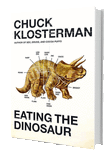
I didn't expect Chuck Klosterman's 2009 offering, "Eating the Dinosaur" to be fodder for my writing. In fact, it was only in the last 2 or 3 pages that I bit off a nugget that has stuck with me for the past number of days. This is not to say that the rest of the book wasn't thought-provoking; it was, but in a different way than most of the books that litter the shelves of my library. The personal interest here was more centred on the reminiscence of my high school days, as when writes about Nirvana's "In Utero" album - good writing, but not what I would consider to be philosophically heavy or academic.
However, on the last few pages when he ponders the manifesto of Ted Kaczynski (the Unabomber), a thought about technology jumped out at me. His conclusion is this:
"Technology is bad for civilization. We are living in a manner that is unnatural. We are latently enslaved by our own ingenuity, and we have unknowingly constructed a simulated world. The benefits of technology are easy to point out (medicine, transportation the ability to send and receive text messages during Michael Jackson's televised funeral), but they do not compensate for the overall loss of humanity that is its inevitable consequence. As a species we have never been less human that we are right now." (228)
This conclusion is based on an earlier examination of Kaczynski's thought. He imagines a scenario where he has become accustomed to a style of living dependent upon a certain technology - in this case, he imagines an air conditioner. He outlines the following logic to explain Kaczyinski's argument:
"For the air conditioner to work, I need to live in a building that has electricity, so I have to be connected to the rest of society. That's fine. That's no problem. Of course, to be accepted by that society, I have to accept the rules and laws of community living. That's fine too. Now, to thrive and flourish and afford my electric bill, I will also have to earn money. But that's okay - most jobs are social and many are enriching and unnecessary. However, the only way to earn money is to do something (or provide something) that is valued by other people. And since I don't get to decided what other people value, what I do to make a living is not really my decision. So - in order to have air-conditioning - I will agree to live in a specific place with other people, following whatever rules happen to exist there, all while working at a job that was constructed by someone else for their benefit. In order to have a 70-degree living room, I give up almost everything." (225-226)
I am predominantly fascinated by the his assertion that "we are latently enslaved by our own ingenuity". Much has been written about the speed at which technology both changes and improves. A fascinating principle of this can be seen in Moore's Law which has to do with the number of transistors that can fit on a processor, which is said to double every two years. This exponential growth also creates exponential change in the speed and power of those pieces of technology which they power. Many theories grow out of this law (see Singularity), but not often have I read an argument that claims that we are enslaved by the speed at which technology changes and 'improves' - our ingenuity.
I have often read about how technology changes us ("The Shallows" - Nicolas Carr) and about how we need to critically evaluate technologies because of their inherent value system. But, it was new to me to read about technology's role in human freedom. If Klosterman's logic is true, how does this effect the way we live our lives? In what ways does this 'enslavement manifest itself in our lives? In the end, Klosterman concedes that while he agrees with this argument in theory, it's not enough to make him change anything about his life. That's a sad statement, but I think we can all relate. It must be true that our use of technology changes us, but to live our lives there has to be a constant balancing act between the pros and the cons. Through technology we have gained many new freedoms in the last century, but there are innumerable other ways that we repress realities about how these same technologies adversely effect our freedom, and thus enslave us.
Carr, Nicholas. The shallows: how the internet is changing the way we read, think and remember. London: Atlantic Books, 2010.
Klosterman, Chuck. Eating the dinosaur. New York: Scribner, 2009.

 RSS Feed
RSS Feed
